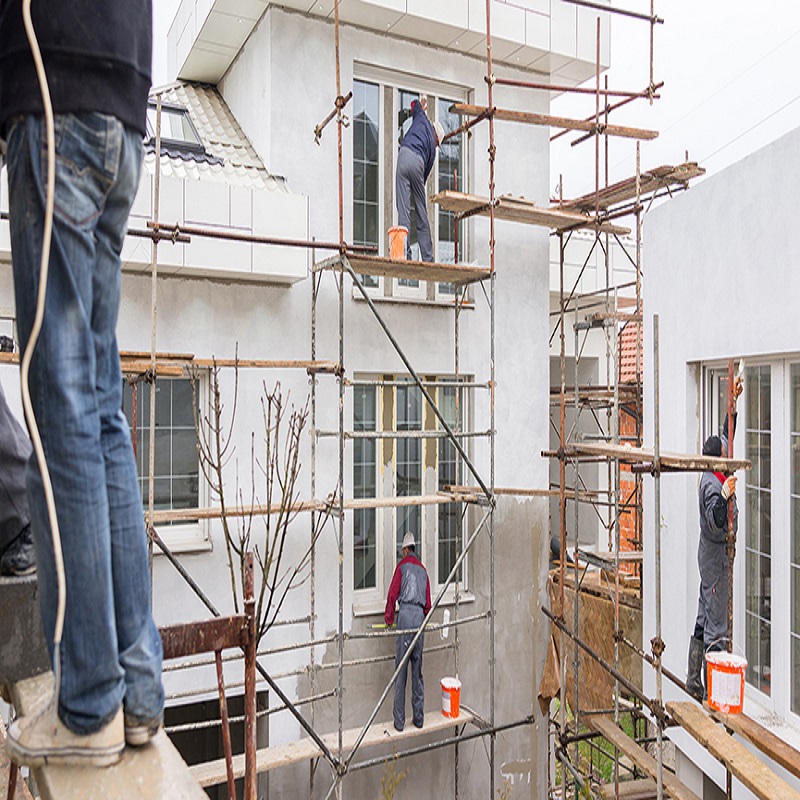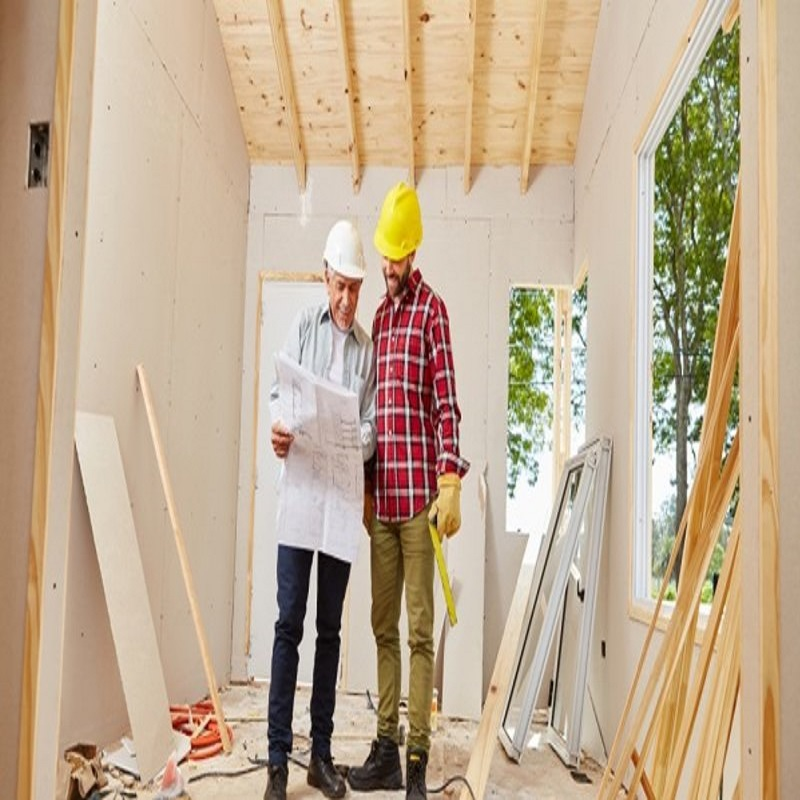Building renovations
Or Call: (020) xxxx–xxxx
Renovating a property can be a daunting task. Whether you are looking for cosmetic renovations, structural renovations, or both, it is vital to approach this project with the proper knowledge and information to make an informed decision.
This comprehensive guide will look at building renovations, why people renovate their facilities and types such as cosmetic or structural. We will also discuss the process of renovating your property from start to finish. So if you’re considering carrying out any work on your building, then read on!
What are building renovations?
Building renovations are any changes you make to your property that requires specialist knowledge and experience. These renovations can range from minor repairs to major structural works, including a basement, an extension, or loft conversion.
Why do people renovate their buildings?
There are many reasons why someone would consider carrying out work on their building, such as:
- Structural inadequacy – problems with the structure of a house, e.g., drainage issues or roof damage, could make it necessary for extensive restoration work to ensure safety and comfort within the home.
- Redesign floor plans – interior design trends change over time, which means what was considered modern 20 years ago now looks dated today, so by changing things like wall colour or flooring, the house can feel more up-to-date.
• Improve energy efficiency – houses often lose heat through windows, and single glazing is insufficient to keep the warmth in which means heating bills are higher than they need be, so replacing old double glazed units with new triple-glazed ones could mean significant savings on your monthly utility bill;
Types of renovations
There are two types of renovations, structural and cosmetic.
a) Structural renovation
These types of renovation usually involve the structure of a building, such as the floor plans or adding another level. Examples include
- Extensions: Extensions are a popular renovation choice for people who want more room. You can use them to increase the size of your existing living area or create a separate study space.
- Loft conversions: Converting an attic into additional rooms allows homeowners to increase their usable square footage without moving out. Many families will turn one level of their house (the loft) into bedrooms and bathrooms;
- Construction of a basement: A basement conversion is a modern building renovation. It’s often the cheapest way to add space and light while also increasing security in your home.
- Redesign of floor plans: This type of renovation can be used for any size property, from a studio apartment with no windows or doors in some rooms to multi-story homes where you want more modern living arrangements without having to move out. You’ll need an architect who specialises in cabinetry design if you’re thinking about this kind of project.
- Re-wiring: Wiring needs updating when there are problems such as poor insulation due to old wires that have been exposed over time by wear and tear around sockets or switches, which causes overheating and possible fire hazards.
- Re-plumbing: Plumbing requires updating when you see that the piping is rusting or leaks, water damage and mould growth in your home, leading to health problems for people living inside it. It’s also a good idea to replace old plumbing with new materials such as PEX tubing instead of traditional copper pipe because they’re more durable and easier to work with;
b) Cosmetic renovation
The other type of building renovation is cosmetic renovation which involves things geared towards improving the aesthetics of your building. Some cosmetic renovations include
- Painting and other forms of decoration: If you have a building that’s been built for a while, the paint on the walls is likely to be faded and discoloured. A fresh coat of exterior paint can significantly improve your home’s curb appeal;
- Minor repairs: Sometimes, all you need are minor repairs done by carpenters, including patching holes in drywall or woodwork caused by nails or screws, replacing rotted wooden boards and repairing damaged door frames. These jobs require only standard carpentry tools like saws and hammers, so they’re easy to do if you know what you’re doing.
- Flooring: Flooring is one of the most important things you can do to your home. It’s a process of resurfacing or covering the floor with new material to enhance its appearance and give it more protection from damage.
- Updating fixtures and fittings: Fixtures are those accessories that you can’t remove easily, such as ceiling lights, doorknobs, taps, sinks etc. While some people choose to replace them when they renovate their homes, others prefer updating them instead, which means replacing old ones simply by cleaning them up and upgrading certain parts of the fixture without going all out for replacement.
• Light landscaping: It is the process of altering or changing the outdoor appearance to make it more pleasing. This involves creating different scenes in your garden, such as adding a small pond, water fountain, stones etc., rearranging flowers and plants, planting trees, digging new beds- basically anything that can change how you view things outside.





What is the process for renovating a property?
- Consultation with experts
Depending on what your plans for renovations entail and how extensive they need to be conducted, you might require consultations with professionals who have experience in specific fields of work related to construction management.
You should contact building restoration specialists if elements require replacing or restoring, whereas interior designers will help create spaces within buildings according to plan specifications provided by clients themselves. If the property needs structural renovation, it has to go under engineering assessment, which involves surveys performed by geotechnical engineers and soil scientists working alongside architects also involved in the project.
- Budgeting and financing
Once you’ve decided how much money you’re willing to spend on the entire project, make sure your budget includes all expenses, including labour costs (if applicable) and any additional materials you may need.
Make sure to get a loan from your bank or other financial institution before starting the renovation to make it easier for them to approve the amount if they see that you’ve already started working on it.
- Condition assessment
Condition assessment is the process of checking the current condition and comparing it to its original state when it was first built.
Condition assessment is essential because you don’t want any surprises once construction begins, such as discovering that renovation would be more costly than expected due to damage from water or termites.
Another benefit of condition assessment is comparing the building’s current state to its original state.
For example, if your roof were damaged during a storm and needed replacing, it would be helpful to know whether that section of the roof is part of overall general disrepair or simply due for replacement.
- Secure the building
After condition assessment has been done, securing the building is necessary before renovation begins. This means that anyone who might damage or vandalise your property while construction takes place needs to be moved on by law enforcement officials until completion is achieved.
This protects your assets and ensures safety among workers, as most accidents happen within the first few days after work commences. This step requires seeking out permits from local authorities to carry out repair work.
- Consents and approval
Apart from permissions granted by local authorities, it is also necessary to obtain approval for any structural changes that you might want to introduce. This means checking with the city planning office and getting a building permit if your project requires one.
- Initial construction work
Construction begins only after all approvals have been obtained, which ensures nothing goes wrong in the renovation. It is also necessary to obtain permits to ensure contractors can carry out their tasks without worrying about unnecessary impediments along the way, such as lack of access or interference from third parties such as neighbours who cannot bear construction noise.
- Structural work and extensions
The next step is to assess the existing structure of the building. For example, suppose you consider adding an extension to your property or making structural changes (e.g., converting a garage into another room). In that case, it is essential to know what type of foundation will be required for this work and how much disruption it might cause construction.
- First fix
The first step in renovation is eliminating everything that is no longer used (old fittings, furniture). Keep only items that could come back into fashion at some point because they can also create the desired atmosphere later on when decorating rooms with them; otherwise, all these objects could end up cluttering storage spaces forever. This initial stage involves stripping walls bare to open up the space and remove all interior fittings.
- Decoration
The next step is to start thinking about decoration, which should be carried out during the first two or three months after starting renovation work. During this period, it will also be possible to change some of the original fixtures if necessary because they would still have been in storage until that point; painting walls can take place at any time but ideally should not interfere with other tasks being undertaken tradespeople.
Decorating a room requires much more than choosing colour schemes: furniture must be selected carefully as well since its size could affect what kind of look your home ends up having once renovations are complete. If you fancy something different from standard units, you might consider using vintage or antique pieces, for example.
- Snagging
Snagging is the final step of the renovation process and aims to pick up any minor problems that have emerged. Workers can complete the job or, if you are willing to take on the task yourself, here is a list of common snags which might need your attention:
- Faulty tiling
- Dirty grouting
- Cracked plasterwork
Such issues should not go unnoticed as they may cause further damage in future! If you think there’s even a slight chance one has slipped through (or if you don’t feel like checking), speak with an expert who will be able to help you resolve it without much hassle. At the end of all this hard work, though, comes well-deserved praise from those who have been lucky enough to see your finished masterpieces.
The pros and cons of getting your property renovated
Building renovation has advantages and disadvantages. The benefits include making your old property look great, increasing the value of your home and making it more comfortable to live in. On the other hand, renovation costs a lot of money and may take some time before you can enjoy all its benefits.
Things to consider before starting a renovation project
A successful renovation project begins with thorough planning. To make sure every step is covered from start to finish, keep these tips in mind:
- What is your home renovation budget?
Your budget is perhaps the most crucial consideration. Be realistic about what you can afford to spend on the renovation project, bearing in mind that some aspects of it may be more costly than expected.
- Get planning permission
Suppose your home falls within a conservation area or is listed as an asset of community value. In that case, there are likely to be certain restrictions that will require you first to seek approval from the relevant authority for any alterations made to its exterior appearance and structure. This needs doing before work commences, so make sure you allow enough time for this process!
- Establish a renovation schedule
Once all necessary permissions have been obtained, create an exact timetable with start dates and deadlines for each stage of your building’s transformation. The benefit is that it enables you to tick off each project when the relevant work is completed.
- Ensure you have adequate damp proofing
It can be all too easy in a busy lifestyle to overlook minor problems that may only become apparent much later on; this remains true of damp, which can cause significant damage if not identified early enough. Suppose your home has been through an extensive renovation process recently. In that case, there’s also every chance it would benefit from additional protection against rising moisture levels caused by such changes (such as new windows or walls).
- Commission a building survey
It’s recommended to employ a professional building surveyor to examine the condition of your property. A full report will detail their findings and outline any necessary work required, along with an estimate for this; they should also be able to provide you with advice on what renovations are worth doing first (i.e. which would offer the most return).
- A successful renovation project starts with thorough planning
As previously mentioned, it enables you to tick off each project as and when the relevant work is completed; there isn’t pressure or temptation, therefore for you to rush into anything before its time. This not only helps keep costs down but allows things like painting colours etc., plenty of thought beforehand – ensuring everything works harmoniously together at all times.
How to find a qualified contractor for your renovation project
The expertise of the contractor you choose is significant. Contractors can make or mar a project. Therefore, the contractor you choose must have sufficient experience in your type of project.
- Use reputable sources to find a reliable home contractor
To find the most suitable person for your renovation project, you can take advantage of many different resources at your disposal; this could include asking friends and family members who they would recommend or searching online via trustworthy companies such as “The National Association of Home Builders” (NAHB). Searching on popular review websites is another great way to discover which contractors have provided high-quality services in their area.
- Interview multiple contractors
Once you have researched reputable local renovation companies, speak with at least three different people before deciding which one will best suit your needs. It’s also good practice to get several estimates from potential contractors so that you can make an informed choice when choosing what company should undertake this critical job in your home improvement plans.
- Ask for references
It is always wise to ask previous customers if they would recommend the services provided by specific individuals or companies (after all, there may be no better reference than someone like you who has used the contractor’s services before). This is an excellent way to learn more about their work ethics and what kind of projects they’ve completed. You should also ask for references from previous clients and check with local authorities (such as your city building office) to see any complaints against them.
- Ask for a formal bid or estimate
The estimate is a necessary part of the renovation process. It’s where you and your contractor determine what needs to be done, how much it costs, and when they can accomplish all this.
- Finance Your Next Home Improvement Project
Before you start your renovation project, if the costs are beyond what you can afford to pay in cash or with a standard line of credit, it may be time to look into financing options.
- Check out their license
Another important consideration when hiring a home improvement company or professional tradesman is whether or not they have proper licensing and insurance coverage. There may be some legal requirements in your area that need to be met, so it would be wise to investigate these factors if you’re required by law to hire contractors with specific qualifications. Contacting the Department of Consumer Affairs will help you determine which regulations are enforced in your state.
- Conduct a thorough background check
Also, it’s recommended to conduct a thorough background check on any potential contractor or professional that you’re planning to hire. You can do this by verifying their legal address and license number with the licensing board in your area. If they are listed online at sites like Home Advisor, Angie’s List, etc., then you should be able to confirm their credentials there as well.
- Find out about subcontractors
You should also check with your homeowner’s insurance company to see if they require that subcontractors carry any necessary insurance. The contractor you choose will likely have their policy covering them and their work on your project. However, it never hurts to ask about this upfront, so there are no surprises later on down the line when you receive a hefty bill for damage caused by an uninsured worker.
- Ask about necessary insurance and permits before getting started
Before starting renovations or construction projects, make sure that all contractors involved are correctly insured and that all licenses needed are in order as well! These could include unique licensing through municipalities regarding plumbing, electrical wiring issues etc. Also, ensure that specific building codes meet your region’s standards. If you are unsure, don’t be shy about asking your contractor to clarify this for you!
- Draw up a contract
Once you have chosen your contractor, it is time to draw up a contract. It would help if you outlined the specifics of the project in detail, including but not limited to:
- What specific tasks will be completed?
- How much money does this cost per hour/day etc.?
- When do you need completion by?
After all these details are laid out, both parties must sign and date the agreement! It may seem like extra work now; however, once construction begins, it will save significant headaches later on down the road if any snags or changes occur that were initially unforeseen. This way, everyone involved knows exactly what needs to get done when and how long it should take!
- Be smart about your payment schedule
Depending on the size of the project and its complexity, additional agreements usually apply for renovations: cost-plus contract (whereby you pay for materials plus labour), an hourly rate agreement, or flat fee arrangement with milestone payments set stages throughout construction. You should also ask if they have worked with clients who had similar projects before – know their background to ensure they will do a great job working with them! Many things are involved in renovating a house – from finding a good contractor and getting the necessary permits to financing your project. If you know what needs to be done, it will make the process much easier!
When do you need to get permits, and what are they used for?
There are generally two types of permits – routine and special. Routine permitting is required for all projects that impact the public right-of-way, such as sidewalks or roadways. Special permits allow you to do something not covered by regular access, like adding to your house or changing building materials on your porch. You’ll likely need both types of permits if you’re renovating your home!
Permits serve many purposes: they make sure construction meets local codes, protect property owners from liability issues, ensure worker safety through inspections by trained professionals, and also preserve community aesthetics (for example, known as view easements). In some locations, it’s even possible to apply online for certain kinds of permits which can help save time and money.
Costs and budgeting for renovations
Cost is the essential element of renovation projects. You can make any number of guesses about how much you will need to spend on your renovation. Still, the only accurate estimate is based upon an actual cost assessment by a home contractor or architect. Many people tend to underestimate costs because they don’t want to think about renovations in terms of money; however, this kind of thinking often leads to financial stress and even defaulting on loans if all funds haven’t been exhausted when the project is complete.
The best way for anyone considering their first home renovation project (or second!) is not to be afraid to ask questions before signing into anything that might lead them down a road filled with unforeseen expenses! Please make sure you have clear contracts at each phase throughout construction. Everyone involved knows exactly what needs doing and how much it costs.
People who are planning to renovate their home should also be sure that they don’t end up in over their head financially; this can put them into a position where they need to go back and borrow more money once the project is complete, which will require even more finance fees! The best way to avoid this situation is simply by doing your research before you start spending any cash on renovations at all – make sure you know what’s involved in each stage of renovation (what needs fixing or replacing?) so when its time for payment there aren’t any nasty surprises waiting around the corner.
FAQ
Would the work cost more than your quote?
This depends on how extensive the work is – if you’re only looking at fixing a few cracks in the wall, for example, then there’s no problem. However, if it comes down to moving walls or installing new water pipes etc., this will affect costs and maybe more than your original quote!
Are all materials supplied?
Yes, they are; however, sometimes certain products might not exist in the UK (such as certain tiles, sinks etc.), and you might need to order them online.
Can I view any of your work/speak to previous clients?
Of course! Don’t hesitate to get in touch with us directly about this when the time comes.
What are building regulations/controls?
Building regulations are rules that all buildings must meet before you can use them for their intended purpose.
Can I do the work myself?
If you have some prior knowledge of renovation work and a reasonable amount of time, it is possible to complete the project on your own. This can be an excellent option for those who enjoy DIY projects!
Are there any government grants/finance packages available to assist in the energy efficiency improvements within my renovation project?
There are many options for renovating your building; however, it is essential to remember that before you start any work on the property (especially if you will do this without professional assistance) or consult with a reliable contractor – there are a few things that you should consider.
Should I view a property before purchasing it, even if I'm renovating it completely?
It’s always recommended that you see any building on which you’re thinking of spending money; however, this cannot apply in every situation – especially when buying off-plan properties where there may not yet be detailed plans available for viewing. In cases like these, checking reviews from previous buyers can often help make up your mind whether this is worth investing in without seeing photos/video walkthroughs.
Do I need planning permission for change of use?
If your renovation involves changing what was once used for (i.e., from an office block into flats), you might require planning consent. Understandably, if changes affect how people live/work nearby, the authorities would likely refuse such works without proper consultation with them first.
Are there any restrictions for renovating a Listed Property?
Suppose you are planning on demolishing or altering anything within a listed property. In that case, it might be more complicated than usual – if not entirely impossible due to having special protection under UK law. It would also depend upon how much work has already been done, what alterations have taken place since its initial construction and whose responsibility they were. This may require specialist advice, so contact your local council first before taking any action yourself.
Do you arrange all the timings for the project?
All our timing schedules are arranged by us directly with tradespeople to guarantee when each stage of renovation begins and ends. This means that things run smoothly without delays, which could cause unwanted stress within your household when people try to plan what renovations need doing next.
Do you have insurance?
We are covered for public liability up to £15m with AXA PPP.
Do I need an architect?
Suppose you’re planning on creating a new layout in your home, then yes. In that case, one must be present during all stages of renovation – especially if building work is involved or if there are plans which require permits from local authorities. Is my property suitable for renovation? You can renovate all types of properties!
Do I need a project manager?
A Project Manager doesn’t actually have to handle the renovation work but instead acts as an intermediary between you and your contractor during the entire project duration – so if you’d rather not deal with multiple parties throughout this process, hiring one would probably save some time.
How long does it take to renovate a property?
The length of time required for renovations varies depending on how much needs to be done. If only minor repairs are necessary, then this process could occur in just several weeks/months, but more extensive changes might require at least a few months’ worth of effort.
If you’d like an estimate based on experience from our company’s previous projects, please get in touch with us directly via phone or email. In addition, we recommend potential clients go through their local council as they may offer grants specifically designed to provide help with renovations.
What types of property are best for renovating?
As a rule of thumb, properties built before the 1940s usually require more extensive work than those constructed after this time. These older buildings may have poorer insulation and outdated heating systems, which you could improve to reduce energy bills in addition to being aesthetically attractive.
Properties whose original construction occurred within the last 100 years would fall under the latter category as they tend to contain better insulation materials than those from earlier decades.
Moreover, such homes might not need as much renovation work done on their equippers (e.g., new roofs) but still can benefit from other changes like repainting or replacing flooring if desired by owner/occupants. Also, these homes might be more affordable to buy in comparison with older buildings.
I have purchased a property without viewing it and discovered I could not make the alterations I wanted. What are my options?
In cases like this, your first step would be to contact the seller and talk with them about their ability to sell you the property as it is. If they are unable or unwilling, then you will need to think of an alternative solution.
Do I need to insure my project?
In the same way, you would a building, if anything were to happen on your site, an insurance company will likely not pay out for unforeseen circumstances. As such, you should always have some form of cover in place to be covered from events like fires and floods, which could cause severe damage. If this isn’t something already included within your purchase, then get advice from insurers about how best to approach this before beginning any work or spending money on materials/equipment etc.
- Do I have to pay tax if I sell my renovation project for a profit?
If you’re selling off part of your land – i.e., properties with space underneath – then you may need to pay business rates. These are the same as standard council tax and depend on which area your property is located in, whether it’s a rural or urban location and where this falls within the country.
What is a structural engineer?
A structural engineer determines whether or not there has been any damage done to your building structure due to something like floods, etc. They are also responsible for checking out your building’s foundation to ensure that the weight of any renovation work you do is supported.

If you need help with anything else please feel free to call us on
020 xxxx xxxx
